« What many people don’t know is that the cost of greens, fruits, and vegetables is much more affordable than meat », remarks a Haitian vegetarian interviewed by AyiboPost
Vegetarianism is gaining followers in Haiti. Subscribers to the movement interviewed by AyiboPost cite various reasons for their refusal to consume meat, fish, or other animal-based products. Some of these reasons include preserving their health, ethical considerations towards animals, environmental sustainability, and spiritual motivations.
However, prejudice is not far behind. « When I say I’m vegetarian, some people label my approach as pure madness, calling me pretentious, or otherwise a bourgeois, » says Wolken Casimir, a soon-to-be graduate in philosophy from the École Normale Supérieure. He has been practicing vegetarianism for nearly two years.
In a country facing a historic food crisis, this dietary choice elicits confusion. « The individuals who adopt it are often perceived as outsiders, eccentrics, different, or even economically privileged, but this perception is wrong! » shares drummer Raymond Noël, also known as « Welele Doubout. » He became a vegetarian for health reasons in the early 2000s.
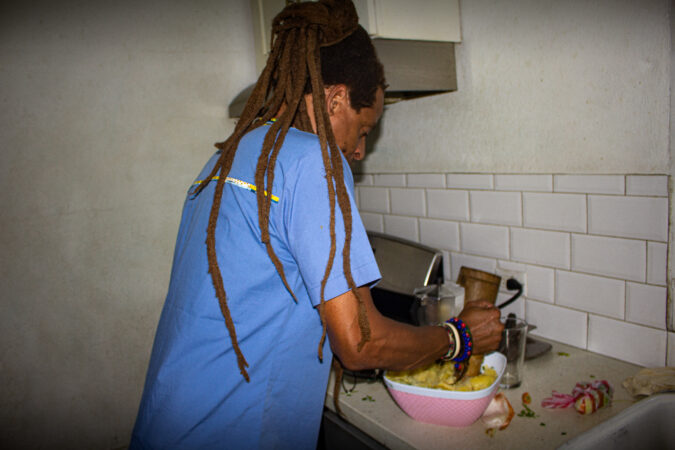
In his kitchen, Raymond Noël, nicknamed « Welele Doubout, » is in the process of preparing mashed potatoes with the intention of creating a composed dish. | © Jean Feguens Regala/AyiboPost
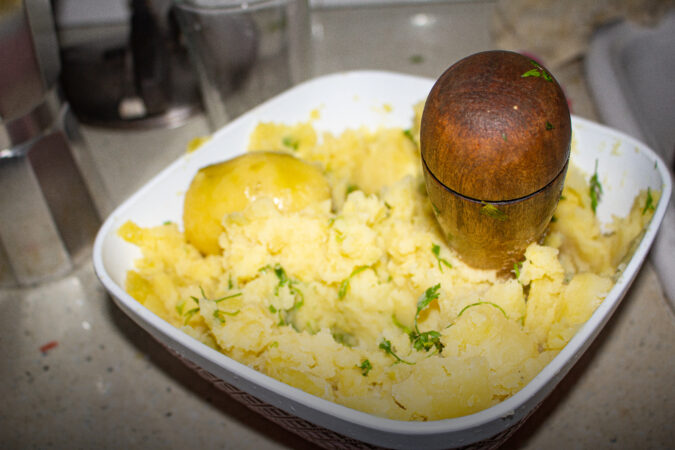
The mashed potato being prepared by Raymond Noël. | © Jean Feguens Regala/AyiboPost
Indeed, there are numerous misconceptions about vegetarianism. In reality, this diet is not simply limited to consuming vegetables. There are various subcategories, depending on the foods consumed.
One such category is lacto-ovo-vegetarians, who exclude meat but consume dairy products and eggs.
Lacto-vegetarians, on the other hand, exclude meat and eggs but continue to consume dairy products.
Ovo-vegetarians exclude meat, dairy products, and eggs but may include other animal-derived products such as honey.
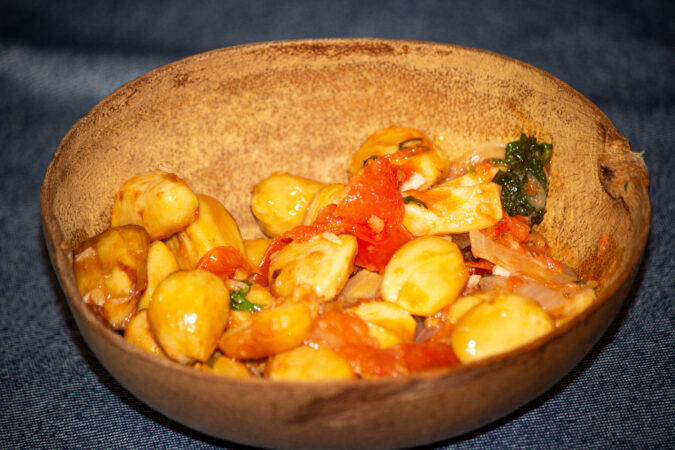
In a bowl, Raymond Noël is placing the prepared breadfruit for his composed dish. | © Jean Feguens Regala/AyiboPost
There are also vegans. These are individuals who exclude all animal-derived products from their diet and lifestyle; choosing plant-based alternatives for their food, clothing, and other aspects of life instead. This includes not only meat, fish, shellfish, dairy products, and eggs but also animal-derived products like honey and butter, to name just a few.
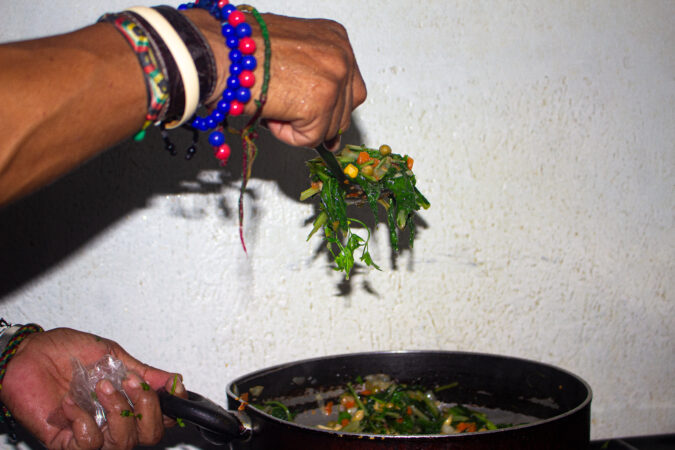
Noël is preparing a composed dish using spinach and peas. | © Jean Feguens Regala/AyiboPost
James Vergneau, also known as « Rebel Layonn, » observes that the price of most dietary staples has tripled in the last two years due to inflation. An artist and a yoga teacher, he has been practicing vegetarianism for nearly 25 years.
To maintain a healthy and balanced diet, Rebel Layonn uses his creativity and makes use of a variety of herbs and greens that are common to our daily lives.
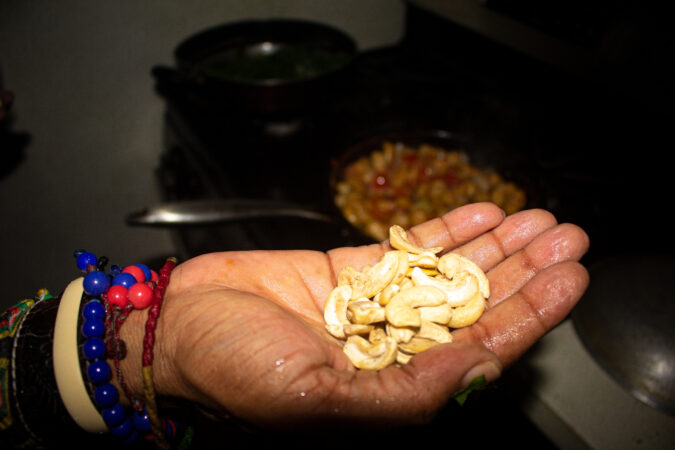
Noël is about to add nuts to the bowl of breadfruit. | © Jean Feguens Regala/AyiboPost
Other followers manage to make ends meet by adopting a simplified approach to meal preparation.
« What many people don’t realize is that meat is much more expensive than greens, fruits, and vegetables, » says Malaika Lamarre, a vegetarian and current graduate student at the Faculty of Applied Linguistics (FLA).
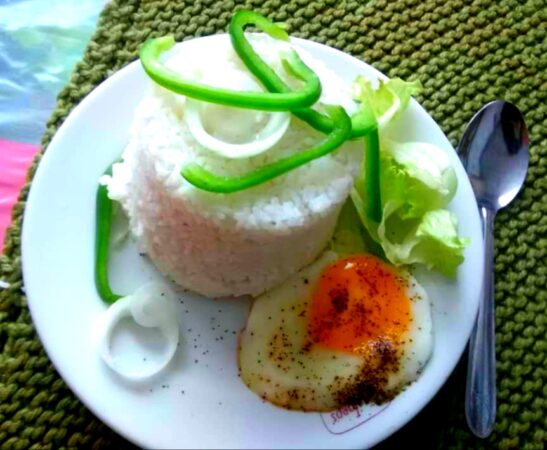
A dish of white rice with poached eggs prepared by © Malaika Lamarre.
« Thanks to the consumption of seasonal foods, » says the CEO of Natirèl-Ayiti, « I am able to use a wide variety of recipes that are very budget-friendly. »
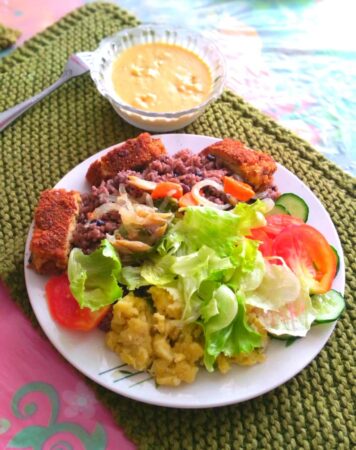
A dish of sticky rice with black-eyed peas, green salad, and crispy potatoes with cheese sauce, prepared by © Malaika Lamarre.
According to the Food and Agriculture Organization of the United Nations (FAO), in 2020, Haiti cultivated approximately 26,000 hectares of vegetables, resulting in an estimated production of 120,748 tons.
That said, production declined in 2013 to 125,000 tons and further decreased to 120,000 tons in 2020, in the case of vegetable products such as carrots, spinach, potatoes, cabbage, tomatoes, lettuce, or leeks.
« I am generally inclined towards everything natural, excluding Genetically Modified Organisms (GMOs), pesticides, and herbicides, » says James Vergneau, who practices agroforestry beekeeping and actively engages in environmental protection and preservation.
« I consume between 80% and 90% of local products, » Vergneau adds, acknowledging that he faces challenges in finding locally grown fruits that are typical of Haiti.
Lire aussi : Certaines familles haïtiennes préfèrent le miel au sucre raffiné. Voilà pourquoi.
Haitian vegetarians are often forced to rely on themselves. According to Vergneau, « up to now, there is no specialized vegetarian restaurant in the country, » although some establishments offer vegetarian menus.
Lisa Pierre, a vegan culinary chef with a passion for vegetarian cuisine, had the idea, since 2020, of creating her own fully vegan restaurant in Haiti called « Lakou Zazou. » Her goal was to share her culinary expertise while helping her customers to maintain a healthy and balanced diet. « I had already found the location, and investors were also interested, » she says. « I had everything in place, but unfortunately, given the sweeping insecurity in the country, I made the decision to give up. »
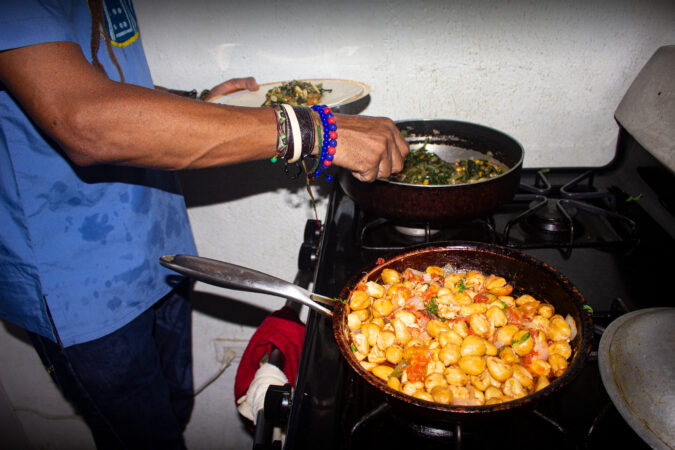
The cooking is complete. Noël is finalizing the meal preparation. | © Jean Feguens Regala/AyiboPost
Lakou Zazou would have been a true home for vegetarians and those who wish to experience a vegan diet. Pierre wanted to make it a place that highlights local production while exposing foreigners to the various aspects of Haitian gastronomic culture. « I sincerely hope that the country’s situation improves so that we can come back and invest in Haiti, » adds Lisa Pierre.
Vegetarians and vegans offer relief to the planet. According to a report published by the FAO in 2016, 14.5% of human-induced greenhouse gas emissions are attributed to livestock supply chains, which equates to 7.1 gigatons of carbon dioxide (CO2) emissions each year.
« It is essential to understand that when you reduce your meat and dairy consumption, you are unknowingly contributing to the ecological preservation of our planet, » says Vergneau. « Animal production, whether it be cattle farming, dairy farms, pig or poultry farming, is a significant source of greenhouse gasses, particularly methane and nitrous oxide, which contribute to climate change, » adds Rebel Layonn.
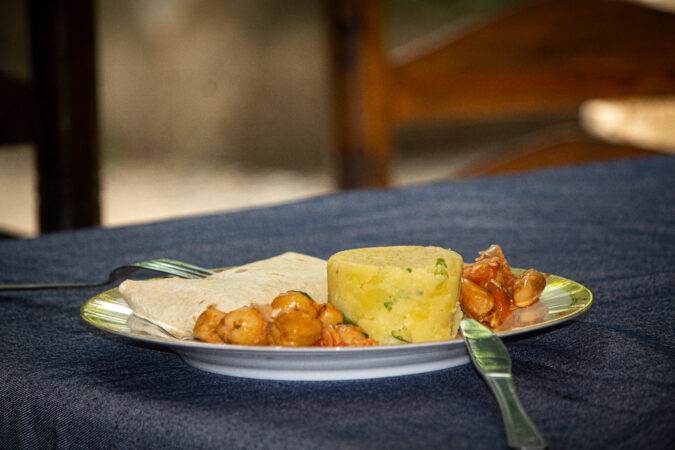
The food is ready. | © Jean Feguens Regala/AyiboPost
Far from ecological considerations, some view vegetarianism as a way of life.
« Since I made the decision to reorganize my diet, I have felt a greater sense of mindfulness and open-mindedness, » says Malaika Lamarre with calm and serenity. « I also feel more connected to nature, through water, earth, and many other elements. »
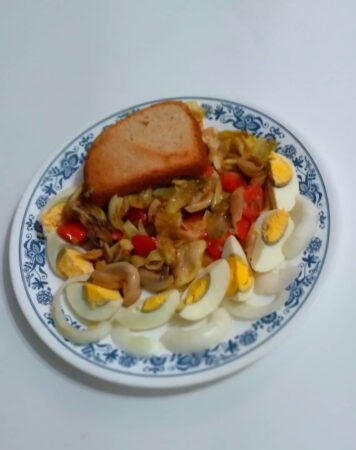
A dish of pasta with tomato sauce, boiled eggs, and whole wheat bread, prepared by © Malaika Lamarre.
Wolken Casimir insists that vegetarianism is a way of life. « People have a hard time accepting our choices, but I have learned to accept myself as I am, » he says. « This transition to a vegetarian diet requires courage and perseverance because I can affirm that it is not easy at the beginning. However, it is an experience that is well worth it. »
Rebel Layonn goes even further, stating, « The way I nourish my body has both a physical and spiritual impact. I encourage you to try limiting your meat consumption and to listen to the signals your body sends you. You will realize that you will feel better! »
English translation by Sarah Jean.
Cover photo: The table is set at Raymond Noël’s place. | © Jean Feguens Regala/AyiboPost
Discover our special AyiboLab episode featuring James Vergneau, also known as Rebel Layon, who has been a vegetarian for about 25 years :
Stay in touch with AyiboPost through :
▶ Our Telegram canal : click here
▶ Our WhatsApp Community : click here







Comments